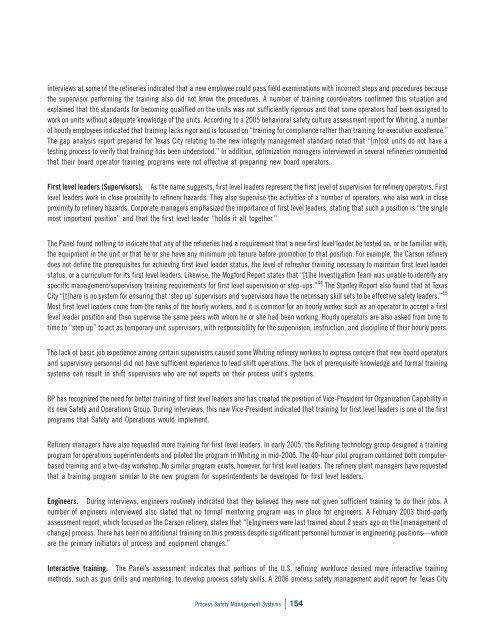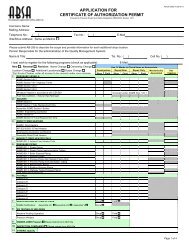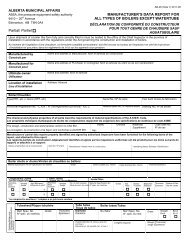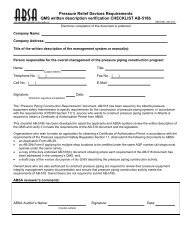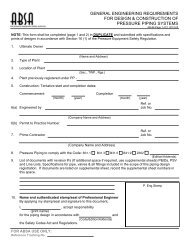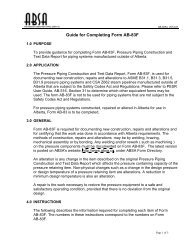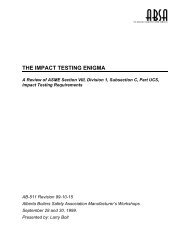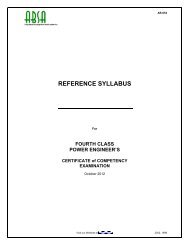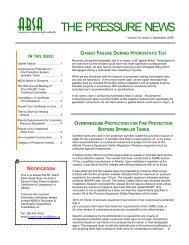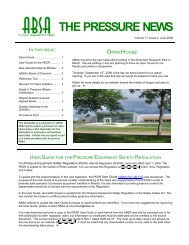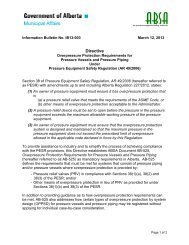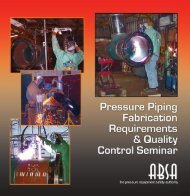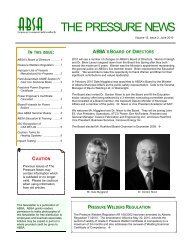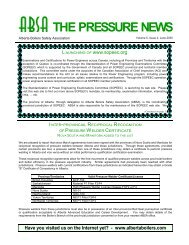The Baker Panel Report - ABSA
The Baker Panel Report - ABSA
The Baker Panel Report - ABSA
You also want an ePaper? Increase the reach of your titles
YUMPU automatically turns print PDFs into web optimized ePapers that Google loves.
interviews at some of the refineries indicated that a new employee could pass field examinations with incorrect steps and procedures becausethe supervisor performing the training also did not know the procedures. A number of training coordinators confirmed this situation andexplained that the standards for becoming qualified on the units was not sufficiently rigorous and that some operators had been assigned towork on units without adequate knowledge of the units. According to a 2005 behavioral safety culture assessment report for Whiting, a numberof hourly employees indicated that training lacks rigor and is focused on “training for compliance rather than training for execution excellence.”<strong>The</strong> gap analysis report prepared for Texas City relating to the new integrity management standard noted that “[m]ost units do not have atesting process to verify that training has been understood.” In addition, optimization managers interviewed in several refineries commentedthat their board operator training programs were not effective at preparing new board operators.First level leaders (Supervisors). As the name suggests, first level leaders represent the first level of supervision for refinery operators. Firstlevel leaders work in close proximity to refinery hazards. <strong>The</strong>y also supervise the activities of a number of operators, who also work in closeproximity to refinery hazards. Corporate managers emphasized the importance of first level leaders, stating that such a position is “the singlemost important position” and that the first level leader “holds it all together.”<strong>The</strong> <strong>Panel</strong> found nothing to indicate that any of the refineries had a requirement that a new first level leader be tested on, or be familiar with,the equipment in the unit or that he or she have any minimum job tenure before promotion to that position. For example, the Carson refinerydoes not define the prerequisites for achieving first level leader status, the level of refresher training necessary to maintain first level leaderstatus, or a curriculum for its first level leaders. Likewise, the Mogford <strong>Report</strong> states that “[t]he Investigation Team was unable to identify anyspecific management/supervisory training requirements for first level supervision or step-ups.” 44 <strong>The</strong> Stanley <strong>Report</strong> also found that at TexasCity “[t]here is no system for ensuring that ‘step up’ supervisors and supervisors have the necessary skill sets to be effective safety leaders.” 45Most first level leaders come from the ranks of the hourly workers, and it is common for an hourly worker such as an operator to accept a firstlevel leader position and then supervise the same peers with whom he or she had been working. Hourly operators are also asked from time totime to “step up” to act as temporary unit supervisors, with responsibility for the supervision, instruction, and discipline of their hourly peers.<strong>The</strong> lack of basic job experience among certain supervisors caused some Whiting refinery workers to express concern that new board operatorsand supervisory personnel did not have sufficient experience to lead shift operations. <strong>The</strong> lack of prerequisite knowledge and formal trainingsystems can result in shift supervisors who are not experts on their process unit’s systems.BP has recognized the need for better training of first level leaders and has created the position of Vice-President for Organization Capability inits new Safety and Operations Group. During interviews, this new Vice-President indicated that training for first level leaders is one of the firstprograms that Safety and Operations would implement.Refinery managers have also requested more training for first level leaders. In early 2005, the Refining technology group designed a trainingprogram for operations superintendents and piloted the program in Whiting in mid-2006. <strong>The</strong> 40-hour pilot program contained both computerbasedtraining and a two-day workshop. No similar program exists, however, for first level leaders. <strong>The</strong> refinery plant managers have requestedthat a training program similar to the new program for superintendents be developed for first level leaders.Engineers. During interviews, engineers routinely indicated that they believed they were not given sufficient training to do their jobs. Anumber of engineers interviewed also stated that no formal mentoring program was in place for engineers. A February 2003 third-partyassessment report, which focused on the Carson refinery, states that “[e]ngineers were last trained about 2 years ago on the [management ofchange] process. <strong>The</strong>re has been no additional training on this process despite significant personnel turnover in engineering positions—whichare the primary initiators of process and equipment changes.”Interactive training. <strong>The</strong> <strong>Panel</strong>’s assessment indicates that portions of the U.S. refining workforce desired more interactive trainingmethods, such as gun drills and mentoring, to develop process safety skills. A 2006 process safety management audit report for Texas CityProcess Safety Management Systems C 154


